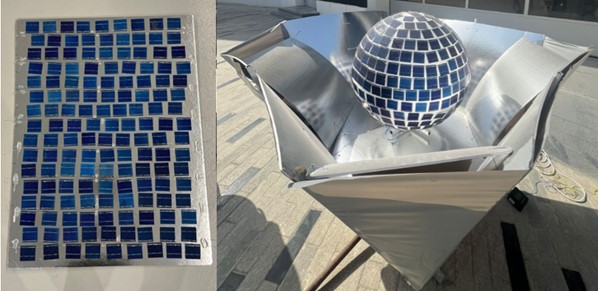About Spherical Solar PV System:
This research project investigates the comparative performance of spherical and conventional flat photovoltaic (PV) modules under real outdoor climatic conditions. The key objective is to determine whether spherical configurations can overcome the drawbacks of flat solar panels in directional dependence, heat accumulation, and dust deposition, particularly in harsh weather conditions such as those of Qatar. In the project, similar silicon solar cells have been used to fabricate both flat and spherical PV modules to ensure fairness in performance comparison. The panels were mounted side by side on an open testbed, where data is currently being collected using a custom Internet of Things (IoT) monitoring system. This system, which is based on the (ESP32) microcontroller, records real-time irradiance, voltage, current, surface temperature, humidity, and dust concentration readings. The aim is to compare the panel's energy yield, interaction with the surroundings, and overall reliability under the same conditions of exposure over the course of a day.
Early observations show promising trends for spherical design. The module has demonstrated consistent output under varying sunlight angles, especially in early mornings and late afternoons. It appears to have lower surface temperatures and less dust accumulation, and therefore likely lower losses in energy as well as lower maintenance needs. The research study is expected to unlock critical knowledge of the potential for spherical PV modules as reliable, efficient, and low-maintenance alternatives to flat panels. The results will shape solar energy deployment in harsh weather locations and assist Qatar's Vision 2030 national sustainability initiatives through localized, innovative, and youth-led renewable energy solutions.
Scientific or Technical Area:
Renewable Energy / Electrical Engineering
Project Timeline:
Ongoing
Main Objectives of the Project:
- Objective 1: Develop and build spherical photovoltaic modules with common silicon solar cells.
- Objective 2: Compare energy yield, temperature behaviour, and dust accumulation between spherical and flat modules under identical conditions.
- Objective 3: Integrate an IoT-based (ESP32) system for real-time environmental and electrical performance monitoring.
Anticipated Impact and Relevance:
This research supports Qatar Vision 2030's vision of sustainable energy development by providing a low-cost, maintenance-free approach to flat PV systems. The study enhances solar energy harvesting efficiency in harsh climates by employing innovative geometric design. The spherical PV modules have improved angular capture, passive cooling, and dust resistivity, making them ideal for city rooftops, off-grid shelters, and desert applications. The project promotes youth-led innovation, smart monitoring integration, and green technology solutions on a scalable level to global and domestic energy problems.
Supervisor(s) Details:
-
Full Name: Dr.
Amith Khandakar
-
Department or Unit:
Department of Electrical Engineering
-
Institution/Affiliation:
Qatar University
-
Email Address:
amitk@qu.edu.qa
Team Members Involved:
- Mohammed Riazul Islam Sarker, BSc, Electrical Engineering, College of Engineering
- Ahasanur Rahman, BSc, Electrical Engineering, College of Engineering
- Kevin Thomas, BSc, Electrical Engineering, College of Engineering
- Dr. Mohammed Arsalan Ayari, Associate Professor, Civil and Environmental Engineering, College of Engineering
Picture of the Prototype:
The following figure shows the final protype of the flat panel and the spherical solar panel:
